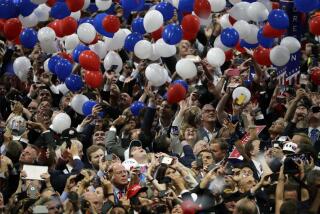Utah weighs impact of ruling allowing gay marriage
SALT LAKE CITY — Wade Hunt could see change looming on the horizon, a stubborn movement to legalize gay marriage that crept toward Utah’s Mormon faithful state by state, one same-sex wedding at a time.
But he never dreamed it would reach here.
What works in California, Massachusetts, Minnesota and 15 other states would never fly in the traditional Beehive State, he believed. This is conservative country, where the locally-based Church of Jesus Christ of Latter-day Saints has made clear that a marriage is a bond between a man and a women.
“When it came to gays, my attitude was ‘I respect you, you respect me,’” he said. “We weren’t looking for a big fight.”
Now a federal judge has reminded residents that while many might consider themselves in a religious land apart, some beg to differ. This month, U.S. District Judge Robert Shelby struck down the state’s 2004 constitutional amendment limiting marriage to opposite-sex couples, ruling that the move violated the U.S. Constitution’s guarantee of equal protection under the law.
While the reaction of the LDS church has been largely low-key, many of Utah’s 2 million Mormons were grasping to absorb what the ruling meant — and how to possibly get it repealed — as same-sex couples rushed to tie the knot. In the week after Shelby’s Dec. 20 ruling, gay and lesbian applicants made up nearly 75% of the state’s 1,225 marriage licenses issued. The total number shattered Utah’s record for marriage licenses issued in a single week.
For Hunt, 44, a bellhop at a swank downtown hotel a few blocks from the LDS church’s sacred Temple Square, the days have been spent discussing the ruling’s impact with family and fellow Mormons.
“Is it the end of the world? No,” he said, shivering in the 15-degree cold. “In the end, we have a message to the gay and lesbian people who live among us — we don’t hate you, it’s nothing like that. But we believe what we believe. And our conviction is strong.”
Many see the Utah ruling as a harbinger of further change nationwide. Shelby’s decision was the first ruling on the legality of same-sex marriage bans since the U.S. Supreme Court reversed portions of the federal Defense of Marriage Act this summer, said Clifford Rosky, a University of Utah law professor and chairman of the board of Equality Utah, a group that is pushing for gay unions.
He said the decision was being watched by states facing challenges to similar bans. Currently, 32 states have passed amendments banning same-sex marriage.
“This ruling sends a powerful signal in one of the nation’s most conservative and Republican states that the federal courts favor the rights of same-sex couples to marry in all 50 states,” said Rosky. “As goes Utah, so goes the nation.” He noted that Shelby’s ruling was met with celebration by gay activists in Utah, with little or no protest from proponents of traditional marriage.
But resistance remains. Utah’s attorney general’s office has already signaled that it will appeal the ruling to the 10th circuit Court of Appeals in Denver. In a tersely worded statement following Shelby’s decision, LDS church officials suggested they saw little room for movement from the status quo.
“The Church has been consistent in its support of traditional marriage while teaching that all people should be treated with respect,” the statement said. As the court decision is reviewed, “we continue to believe that voters in Utah did the right thing by providing clear direction in the state Constitution that marriage should be between a man and a woman.” The amendment passed with 66% of the vote.
Experts say the church’s approach to gay marriage has become more low-key in light of past controversial campaigns. In 2008, the church backed California’s Proposition 8 that banned gay marriage, but the public backlash in TV and print ads by gay rights groups and their supporters caused Mormon leaders to try a softer approach.
“The LDS church is very PR savvy,” said Ryan T. Cragun, a sociologist at the University of Tampa who studies the Mormon faith. “In 2008, the church called down from the pulpit asking members to spend time and money to fight the opposition. They weren’t ready for the backlash and it overwhelmed them.”
In October, as the Hawaii Legislature considered legalizing gay marriage, the church backed off from openly rallying supporters to fight the move. Rosky said the church has issued a series of statements that it is not opposed to housing and healthcare rights for gay couples. “They’re trying to draw a distinction,” he said.
LDS officials also launched a website called MormonsAndGays.org, which backs away from any strident language against those with “same-sex attraction” while continuing to wag a finger against gay sex. “The experience of same-sex attraction is a complex reality for many people,” the site says. “The attraction itself is not a sin, but acting on it is. Even though individuals do not choose to have such attractions, they do choose how to respond to them.”
The shift reflects changing public opinion — and growing acceptance — among Mormons in general regarding gays. This year, hundreds of Mormons marched in the gay community’s Utah Pride Festival in downtown Salt Lake City, clapping as drag queens in high heels traipsed among the crowd. The shift comes as many LDS faithful have also sought a larger role for women in the faith.
Also, a poll this year on civil unions by Brigham Young University’s Center for the Study of Elections and Democracy found that more than half of Mormons favor gay civil unions. Opposition to legal recognition to such unions plummeted this year to just 38%, a fall from 69% just a decade ago, the poll found.
Between 47,000 and 63,000 Utah residents are gay, lesbian or bisexual in a state with a population of nearly 3 million, according to a census analysis by the Williams Institute, a UCLA think tank. A majority live around Salt Lake City.
Utah resident Landon Leetzow says the LDS has fallen behind the times.
The 23-year-old, who helps run a Logan accounting office with his father, left the faith a few years ago over disenchantment with many of its public policies. “For me, the last insult came when I joined the Air Force. People in the church looked down on me for not going on a mission,” he said, describing a period of travel and prayer often expected of young Mormons. “It made me angry. Here I was serving both God and country, but it wasn’t good enough for them.”
Over the last few days, he’s spent hours conversing with friends on social media about the state’s turn toward gay marriage. “Not all conservatives in Utah are against gay marriage,” he said. “I’m a conservative Republican and you know what? We don’t care. I mean, how can you support stopping someone from being happy? What kind of religion is that?”
Hunt knows the importance of shifting definitions of marriage in Utah’s history. In 1896, when admitted to the Union, the new state was compelled by Washington to define marriage as a union between one man and one woman — disavowing polygamy.
“We believe in the laws of the land,” he said. “When they changed, we changed.”
More to Read
Sign up for Essential California
The most important California stories and recommendations in your inbox every morning.
You may occasionally receive promotional content from the Los Angeles Times.










